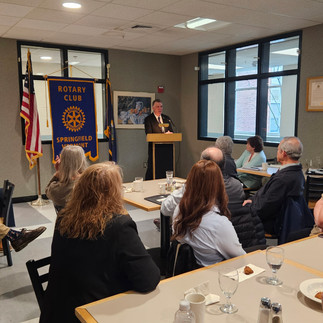Governor Phil Scott recently engaged with community leaders in Springfield, Vermont, at a well-attended lunch hosted by the Springfield Regional Chamber of Commerce and the Springfield Rotary Club. The event, held at the River Valley Technical Center on March 31, 2025, provided a platform for the Governor to address pressing issues facing the state.
The lunch, organized by the Springfield Regional Chamber of Commerce and the Springfield Rotary Club, saw a strong turnout from local figures. Debra Cox, president of the Rotary Club, hosted the event, followed by remarks from Taylor Drinker, Executive Director of the Springfield Regional Chamber of Commerce, and Mike Schmitt, Chamber Board President, Sue Dana, president-elect of the Rotary Club, and Representative Alice Emmons of the Vermont House were among the many attendees eager to hear Governor Scott's insights.
Governor Scott’s address focused on several critical areas, starting with a call for greater civility in political discussions. He then delved into the demographic challenges facing Vermont, highlighting the shrinking workforce and aging population as key drivers of the state’s current difficulties. He emphasized the necessity of expanding the taxpayer base rather than resorting to tax hikes.
Housing affordability was a central theme. The Governor advocated for streamlining building processes and continuing the rehabilitation of existing apartments, acknowledging the progress already achieved.
Education also took center stage. Governor Scott expressed concerns about Vermont's high per-student spending and the need for a more equitable and sustainable funding model. He stressed the importance of ensuring all students have access to extracurricular activities, recognizing their vital role in holistic development.
Public safety was another key concern. Governor Scott called for increased accountability and expanded recovery options for those struggling with addiction. He also discussed his ongoing efforts to eliminate the tax on military pensions and voiced his concerns about the potential negative impacts of tariffs on consumer prices and business relationships.
In his concluding remarks, Governor Scott reiterated the core challenges Vermont faces: housing, affordability, education, and public safety. He reaffirmed his commitment to collaborating with local communities and legislators to tackle these issues and build a more robust future for Vermont.
This lunch provided a valuable opportunity for community leaders to engage directly with the Governor and gain insights into his vision for the state. As Vermont continues to navigate its challenges, Governor Scott’s commitment to collaborative solutions and his focus on key priorities will undoubtedly play a crucial role in shaping the state’s future.



























Comments